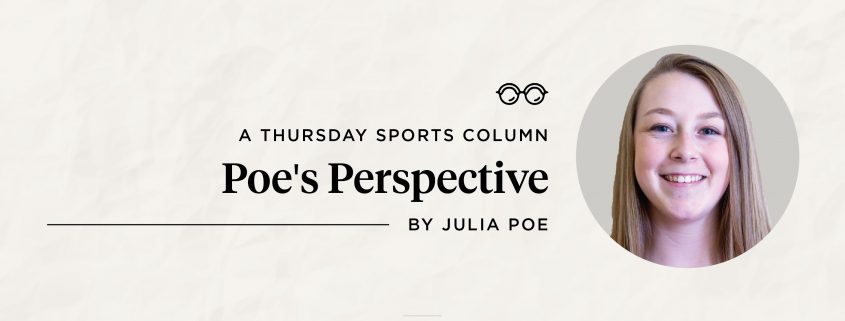Poe’s Perspective: Don’t forget Robinson’s enormous impact
It’s hard now to fully understand the impact of Jackie Robinson in his time. In the week leading up to his annual celebration throughout the MLB, I was struck by this truth during a visit to the Sports Museum of Los Angeles, the sprawling home of one of the widest collections of sports memorabilia in the country. The vast majority of this museum is dedicated to baseball, and specifically the Dodgers, which the city of Los Angeles inherited from Brooklyn.
Over the years, sports have become a time capsule, a mirror that we use to reflect the reality of day-to-day life. Out of sports, we mold heroes that loom larger than life. Many of these men and women are simply great for what they did on the field, but some were their greatest off the field, when the lights turned off, and they faced the world outside of sport. Robinson was one of these superheroes, whose strength went beyond any baseball diamond.
With the museum focused so deeply on Robinson’s lifelong team, it’s impossible to escape him throughout the exhibits. Posters for Jackie, old jerseys, an entire rack of books about the icon — everywhere throughout the museum, the history of Robinson’s career and the legacy that he left behind is memorialized left and right. But what drew me the most was a comic book — titled “Jackie Robinson and the Crucial Series” — detailing his team’s National League duel with the St. Louis Cardinals in 1949.
At the time, comic books were a popular medium. They weren’t just for Wonder Woman and Captain America; comic books and pulp fiction were one of the most popular forms of reading material in the country. While graphic novels have begun to pick up some of this similar appeal in the modern era, the height of the comic book coalesced in many ways with the height of baseball’s popularity.
So it’s not surprising, of course, that a momentous occasion in sports history would be documented at the time in comic book form. Still, while flipping through its pages, I couldn’t help but marvel at the similarities between the way that Robinson was portrayed and the ways that a superhero might be illustrated in a similar comic book.
Especially right now, with the impending premiere of the final Avengers movie, the superhero has retained its height in American pop culture. Most people are familiar with how one of these characters would look in a comic — chiseled with muscle, hands on their hips, eyes glinting as they spouted quick comebacks and beat up the bad guys.
In the comic, Robinson looks the same way. He is illustrated as taller and stronger than the other Dodgers, with thick-cut logs as forearms and bulging biceps. Even the description on the book’s cover — “And it was Jackie, with his fiery spirit, flashing speed and heavy hitting, who led his team to its greatest triumph of all time!” — makes Robinson sound like some sort of superhuman, living out an action hero’s storyline on the baseball diamond.
For some reason, this struck me as, at the same time, wildly outlandish and touchingly true. Robinson was a superhero. He didn’t wear a cape, but he wore a jersey; he didn’t have superpowers, not really, but what wasn’t superhuman about his batting average, or his ability to withstand the brutal racism that followed him throughout his career?
More often than not, we look to sports for heroes, for people to revere for their ability to handle or hit or block or throw a ball. But often, we’re looking to these athletes to be heroes in a different sense, to teach us how to be strong or passionate or charitable. We look to these people as examples of the way we see ourselves and our societies as any given point in time.
It’s true now, and it was true then, too, in Robinson’s time. Then, Robinson was a superhero as strong as any comic book character, a regular hero who beat up the bad guys with his baseball bat every week and proved every bigot on the block wrong.
Often, the proclivity to revere athletes is pointed out as a major failing of sports fans. Why look up to someone, many will say, who is just good at smacking a ball around? What these people fail to see is the power of these athletes outside of the game.
Robinson was the first and perhaps the best to make this point. He was as strong off the field as he was on it, and as good, too. And in that way, he will always be baseball’s — and America’s — superhero.
Julia Poe is a senior writing about her personal connection to sports. Her column, “Poe’s Perspective,” runs weekly on Thursdays.

